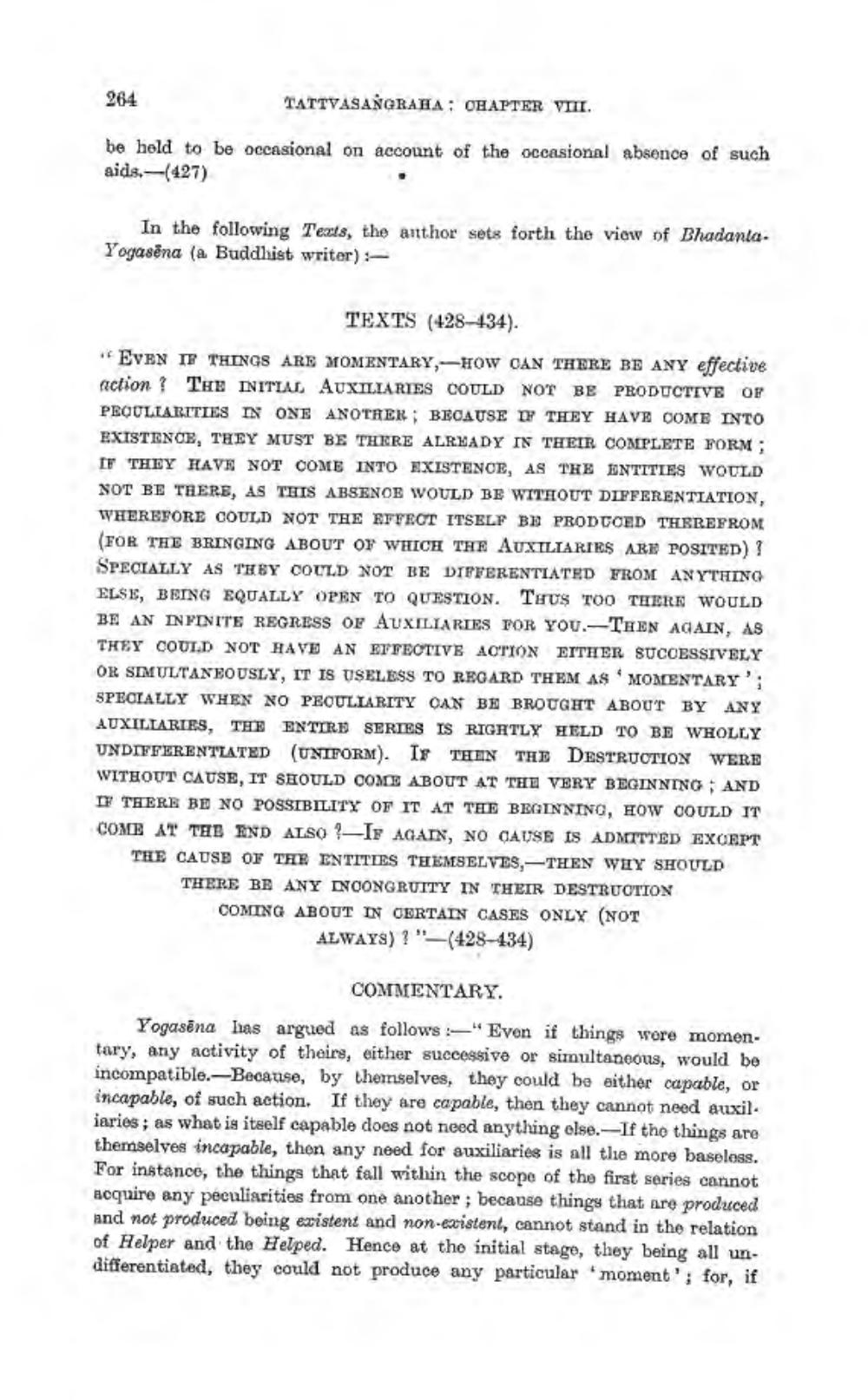________________
264
TATTVASANGRAHA: OHAPTER VIII.
be held to be occasional on account of the occasional absence of such aids.-(427)
In the following Texts, the anthor sets forth the view of Bhadanla. Yogasena (a Buddhist writer):
TEXTS (428-434).
** EVEN IF THINGS ARE MOMENTARY,-HOW CAN THERE BE ANY effective action ? THE INITIAL AUXILLARIES COULD NOT BE PRODUCTIVE OF PROULIARITIES IN ONE ANOTHER; BECAUSE IF THEY HAVE COME INTO EXISTENCE, THEY MUST BE THERE ALRYADY IN THEIR COMPLETE FORM; IF THEY HAVE NOT COME INTO EXISTENCE, AS THE ENTITIES WOULD NOT BE THERE, AS THIS ABSENOE WOULD BE WITHOUT DIFFERENTIATION, WHEREFORE COULD NOT THE EFFECT ITSELF BB PRODUCED THEREFROM (FOR THE BRINGING ABOUT OF WHICH THE AUXILIARIES ARE POSITED)? SPECIALLY AS THEY COULD NOT BE DIFFERENTIATED FROM ANYTHING ELSE, BEING EQUALLY OPEN TO QUESTION. Tous TOO THERE WOULD BE AN INFINITE REGRESS OF AUXILIARIES FOR YOU.-THEN AGAIN, AS THEY COULD NOT HAVE AN EFFECTIVE ACTION EITHER SUCCESSIVELY OR SIMULTANEOUSLY, IT IS USELESS TO REGARD THEM AS MOMENTARY'; SPECIALLY WHEN NO PEQULIARITY CAN BE BROUGHT ABOUT BY ANY AUXILIARIES, THE ENTIRE SERIES IS RIGRTLY HELD TO BE WHOLLY UNDIFFERENTIATED (UNIFORM). IF THAN THE DESTRUCTION WERE WITHOUT CAUSE, IT SHOULD COME ABOUT AT THE VERY BEGINNING AND IF THERE BE NO POSSIBILITY OF IT AT THE BEGINNINO, HOW COULD IT COME AT THE END ALSO ?-IF AGAIN, NO CAUSE IS ADMITTED EXCEPT THE CAUSE OF THE ENTITIES THEMSELVES,-THEN WHY SHOULD THERE BE ANY INOONGRUITY IN THEIR DESTRUCTION COMING ABOUT IN CERTAIN CASES ONLY (NOT
ALWAYS)?"-(428-434)
COMMENTARY.
Yogasēna has argued as follows -"Even if things were momentary, any activity of theirs, either successive or simultaneous, would be incompatible.-Because, by themselves, they could be either capable, or incapable, of such action. If they are capable, then they cannot need auxil iaries; as what is itself capable does not need anything else. If the things are themselves incapable, then any need for auxiliaries is all the more baseless. For instance, the things that fall within the scope of the first series cannot acquire any peculiarities from one another ; because things that are produced and not produced being existent and non-existent, cannot stand in the relation of Helper and the Helped. Hence at the initial stage, they being all undifferentiated, they could not produce any particular moment'; for, if




